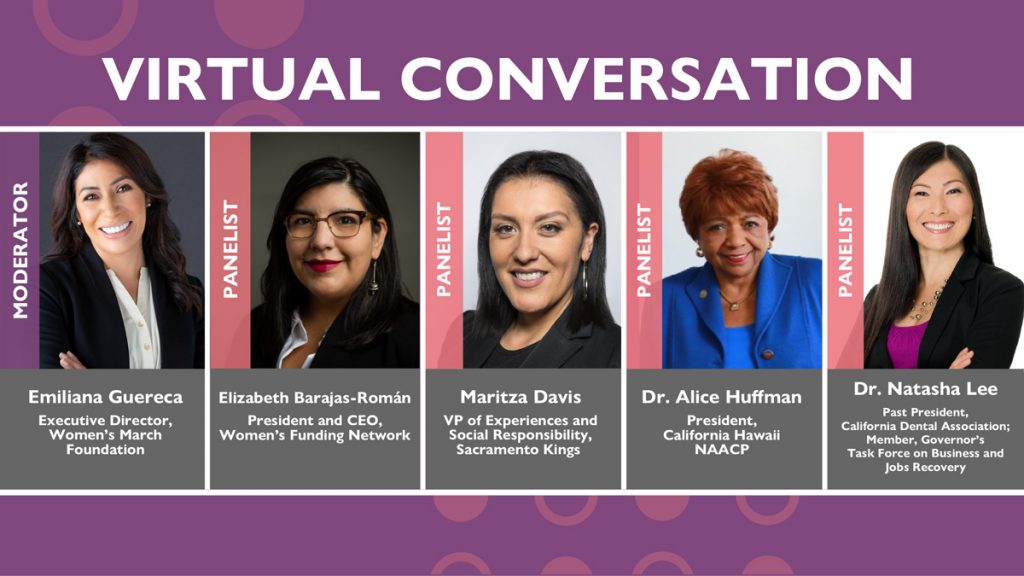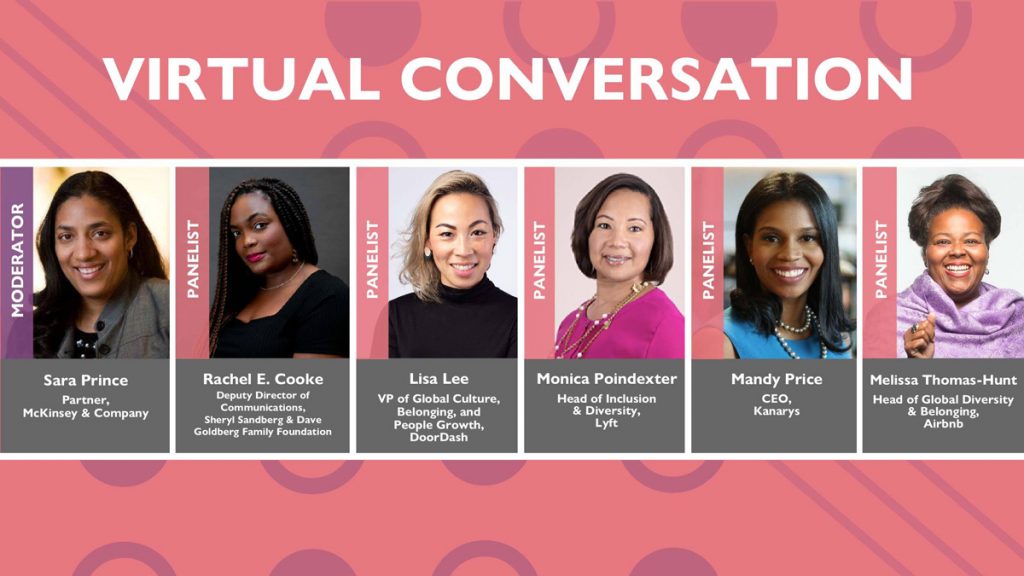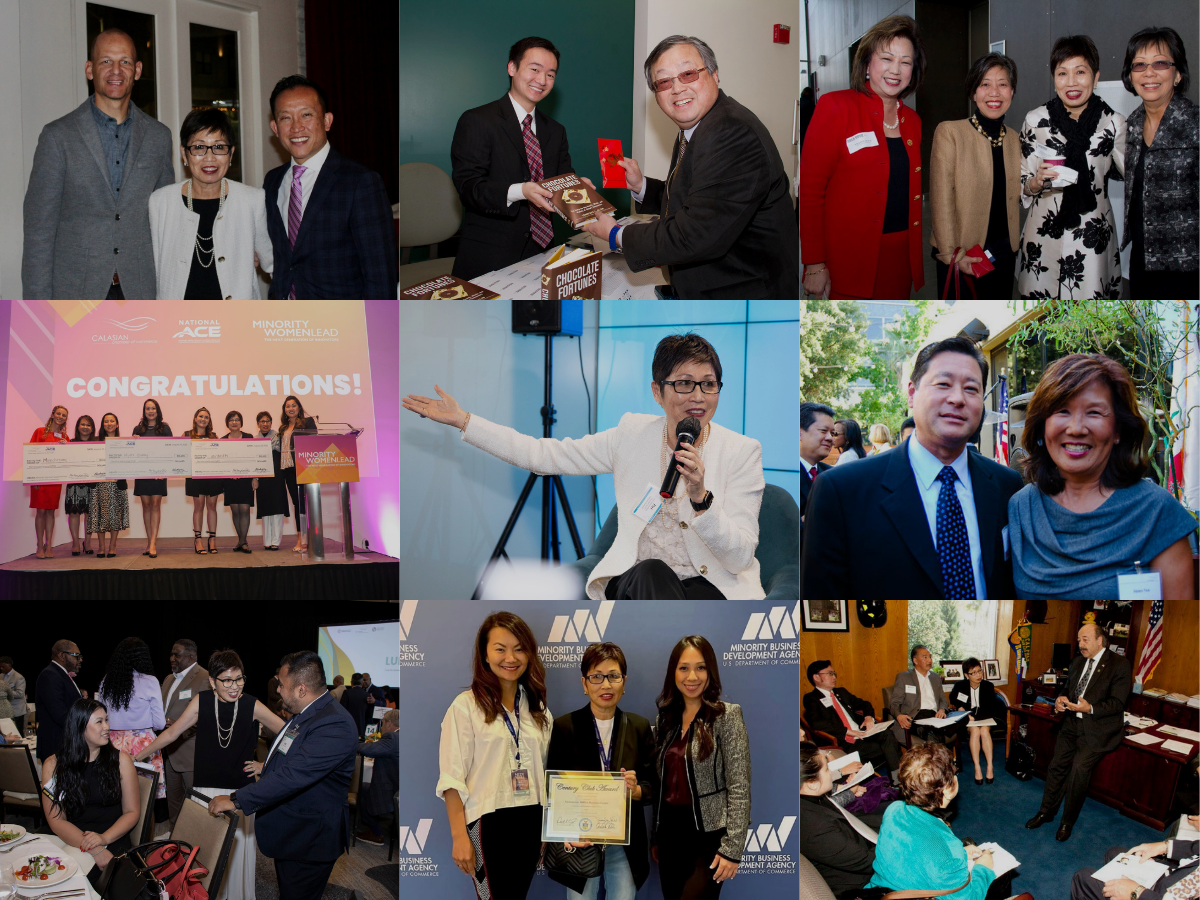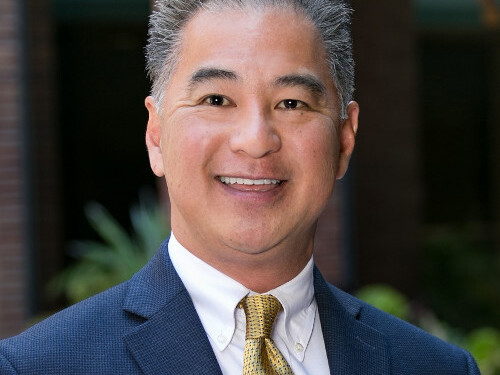#MinorityWomenLEAD | What We Took Away from a Month of Celebrating Women
Last month, we hosted Minority Women Lead to elevate the voices and stories of professional women of color. We launched our first conversation on the topic of the mentor-mentee relationship and the impact it has on leadership; learned what it takes to lead through change as a woman of color; heard the inspiring stories of women who have climbed up the ladder to lead their organizations and communities; and were inspired by the vital work being done to advance Diversity, Equity, and Inclusion within companies and institutions.
While this blog holds only a fraction of the wisdom we learned from all of our inspiring virtual conversations, here are the most valuable lessons we learned throughout the month:
Women Led: Power of Mentorship
Watch the full conversation here.
 1. Mentorship is Partnership
1. Mentorship is PartnershipMentorship is a reciprocal, two-sided relationship. From an outside perspective, successful leaders stand alone at the top. But truthfully, the most successful leaders are those who have a strong trust in their team, network, and community.
Reflecting on her career over the years, keynote speaker Tracey Doi had this key piece of advice to share: “I’ve really been fortunate that I’ve been able to gain insights and inspirations from more than one mentor throughout my career.” She has carried that mindset with her all throughout her career, and continues to build and keep trust relationships in every space she works in.
2. The Responsibility of Mentors
Mentors hold a lot of connections and relationships in every industry they are part of. They are skilled in navigating obstacles and finding ways to make progress and change happen within their field. And one of their greatest duties is mentoring others.
During our mentorship panel, Cassandra Pye stressed the importance of connecting people and to “never underestimate the value of the relationships you have.” As mentors who are also women of color, our panelists are leaders who have paved the path of progress forward for the next wave of emerging leaders.
Adding to the conversation, Mona Pasquil Rogers expressed that “the gift that we can give as mentors, is […] using all these great relationships we have and sharing them.” Doing so provides opportunities for both mentees and colleagues to build new connections and create bigger change in the workplace and in the status quo.
3. The Responsibility of Mentees
Regarding mentees and their path to leadership, Margita Thompson had this key piece of wisdom to offer: “[Put] yourself out there and eventually you are able to become the person that you aspire to be.” While mentors can guide the way, mentees have to fortify their determination and goals to become the change they strive to be, and one of the best ways to start is by being proactive and reaching out.
One of the biggest lessons California State Treasurer Fiona Ma learned from her mentors was to “be loyal, be a voice for those who don’t have a voice, [and] to stand up for what you believe in, even if you’re standing by yourself.” She has carried this piece of wisdom throughout the course of her career, and continues to pass it on to her own mentees even to this day.
Minority Women Leading Through Change
Watch the full conversation here.
1. Leadership is Shaped by Perspective
Our panelists all came from varying backgrounds and upbringing. Some of them were raised by immigrant families, and some of them paved their own path forward. On this topic, moderator Emiliana Guereca said, “People think leaders are born, and I think they are cultivated.”
Touching on her family background and circumstances, Maritza Davis said, “It was expected that I handle all the things that needed to be supported in the family as the oldest, and then being a woman, as a girl in a Latino family, we were taught to serve… I was empowered by many women… the ability to learn to serve is something in which I think has helped me.”

2. Leadership Stems from Mentorship
A great leader is guided by many mentors over the course of their career. From these mentors, they are able to build connections, networks, and improve the leadership pipeline for the next generation of leaders who will succeed them. Mentorship in leadership is especially important to minority women of color, who often feel unsupported and underrepresented it the workplace.
Elizabeth Barajas-Román expressed the joy and importance of mentorship in her own leadership journey when she said, “I’ve had mentorship relationships that have lasted a very long time, through multiple stages in the mentee’s career, and nothing gives me more joy than to seeing them move onto a new level of leadership and be able to actually have mentees themselves.”
Adding to the conversation, Dr. Natasha Lee shared how her early experiences in being mentored shaped her career and even said it “has made [her] really want to serve as a mentor for others.” It has shaped her life both professionally and personally.
3. Leadership is a Way of Life
Dr. Alice Huffman was kind enough to share her motivation and experience in leadership throughout the years. “I’m old enough to retire, I should have retired, but I’m not retiring yet, because I’m still working and still trying to get young people involved, still trying to get them out to vote, and it’s just a way of life. And I don’t know what else I could do besides do this.”
As we learned from our amazing panelists, leadership is a lifelong journey full of connections, changes, and communication. Leadership comes from mentors, colleagues, mentees, and more. Leadership means supporting communities and being supported by their communities in order to create long-lasting and positive change in the world. And most importantly, leadership is possible for everyone.
 Climbing the Ladder and Lessons Learned
Climbing the Ladder and Lessons Learned
Watch the full conversation here.
1. Successful leaders always keep learning
As the world continues to evolve and change, so too must leaders adapt and learn to navigate the shifting landscape. Moderator Terrez Thompson shared a key part of her leadership journey, “It’s just a lesson for me: no matter how long you’ve been around or how old you get, you can always learn something.”
Just like how mentees will always be learning from their mentors, so too can mentors learn from their mentees despite the difference in age or stage of profession. As a leader who has been mentored, and mentors others, Linda Shim has one often-repeated piece of advice to share: “I encourage people to [ask questions], but do it with confidence.”
2. Successful leaders ask for help
Showing any signs of vulnerability or insecurity feels like a weakness that successful leaders can’t afford to have, but vulnerability can actually be a strength when you have a strong community and trusted network to support you. As Sue Bhatia shared from personal experience, “Knowing that you’re not the only one going through what you’re going through is important, and you can dismiss [negative thoughts] more easily.”
3. Successful leaders carve their own paths
People don’t become leaders over night. They are continuously learning and putting in hours of hard work every day to become the best in their profession, field, and career. For minority women and people of color, the journey is ten times harder than their privileged peers. Tina Wei Smith shared a key piece of wisdom when she said, “I would encourage them to really just focus on getting themselves ready to be that expert in that room, or to be that contributor, and to speak up even if they’re not asked to speak up. Really take the courage to have those opportunities.”
In this ever changing world, people will tell you what you need to do to become successful. But what works for them may not necessarily work for you. Find your own path, and as Lisa Chang says, “Don’t let someone else define that success for you.”
Bringing Women of Color to the Table
Watch the full conversation here.

1. Diversity, Equity, and Inclusion Work is Continuous
While others may shy away from the complexity and difficulty of DE&I work, Mandy Price understands that “this is hard work, it’s not something that is gonna be changed over night. But we have make sure that we continue to keep the focus on these issues, and to keep the accountability there.”
Melissa Thomas-Hunt expressed her opinion on the topic as a whole: “I think it’s important for us to continue to keep front and center, that this is really hard work, that we have to be persistent, that we need all of the enthusiasm, exuberance to show up day in and day out, and for us not to lose momentum.”
2. Diversity, Equity, and Inclusion is a Collective Effort
From this amazing panel, we learned that diversity, equity, and inclusion work is not the responsibility of one person, race, or gender. It is a difficult task that cannot be shouldered alone if we want to see sustainable success. Keynote speaker Susan Jin Davis expressed that, “the idea of embedding this work broadly is really important and making it everyone’s responsibility to do something about it.”
Monica Poindexter shared her personal experience with delegating and speaking up in difficult and chaotic situations: “I have realized in these moments that when I need something, I say something, and I ask for what I need. And it’s amazing what response you get, not only from your colleagues, but also from leaders across the organization.”
3. Diversity, Equity, and Inclusion is the Future
Although there has been much progress made over the last few years in the diversity, equity, and inclusion field, there is still so much more work to be done. As Rachel E. Cooke said, “I think the true mark of a good DE&I program at any company, is that if any one of us left that role, that work should still continue. The work should not fail if any one of us were to leave.”
Those who work in DE&I are hopeful, but realistic in their approach towards success. In fact, Lisa Lee said, “I’m a believer that slow and steady wins the race, that we got to keep going and make sure that there are even more women of color having a seat at the table.”
And while it may be several years in the future before many DE&I leaders can see the fruition of their efforts, as Moderator Sarah Prince shared, they are “hopeful that all of this will yield a different outcome” and that the future will have diversity, equity, and inclusion as the norm.
Feeling inspired by all of this women wisdom?
Visit the Minority Women Lead website and watch all the inspiring virtual conversations that occurred last month.
Continue the conversation by joining our Minority Women Lead Newsletter, where we’ll keep you updated on our panelists and share new stories from powerful women leaders.
Share on Social Media
Recent Posts
Celebrating AAPI Heritage Month: Honoring Our Legacy, Building Our Future
This May, we proudly join Governor Gavin Newsom in recognizing Asian American and Pacific Islander (AAPI) Heritage Month—a time to reflect on the strength, resilience, and contributions of AAPI…
May 30, 2025
Leading with Purpose: Lambert Hsu’s Strategic Vision for the CalAsian Chamber
Lambert Hsu, founder and CEO of Benefit Pro Insurance Services in San Diego, has worn many hats over his professional journey—engineer, entrepreneur, advocate—but today, he wears one with particular…
May 16, 2025
7 Content Marketing Mistakes to Avoid
Content marketing has plenty of benefits: It increases website traffic, qualifies leads, and brings in more customers. However, with millions of blogs, checklists, and videos competing for attention,…
May 13, 2025



